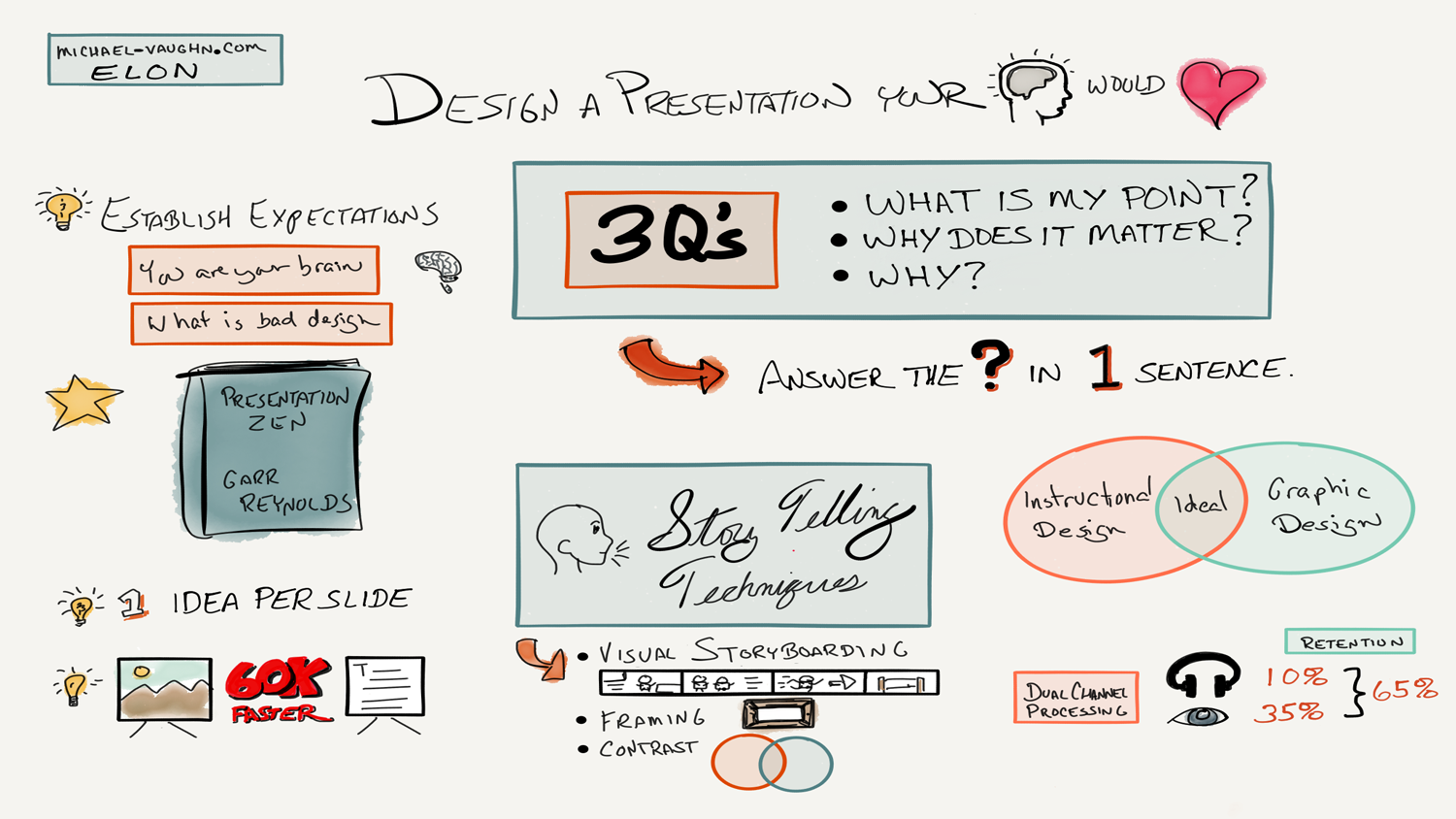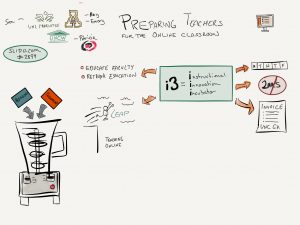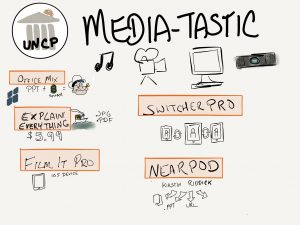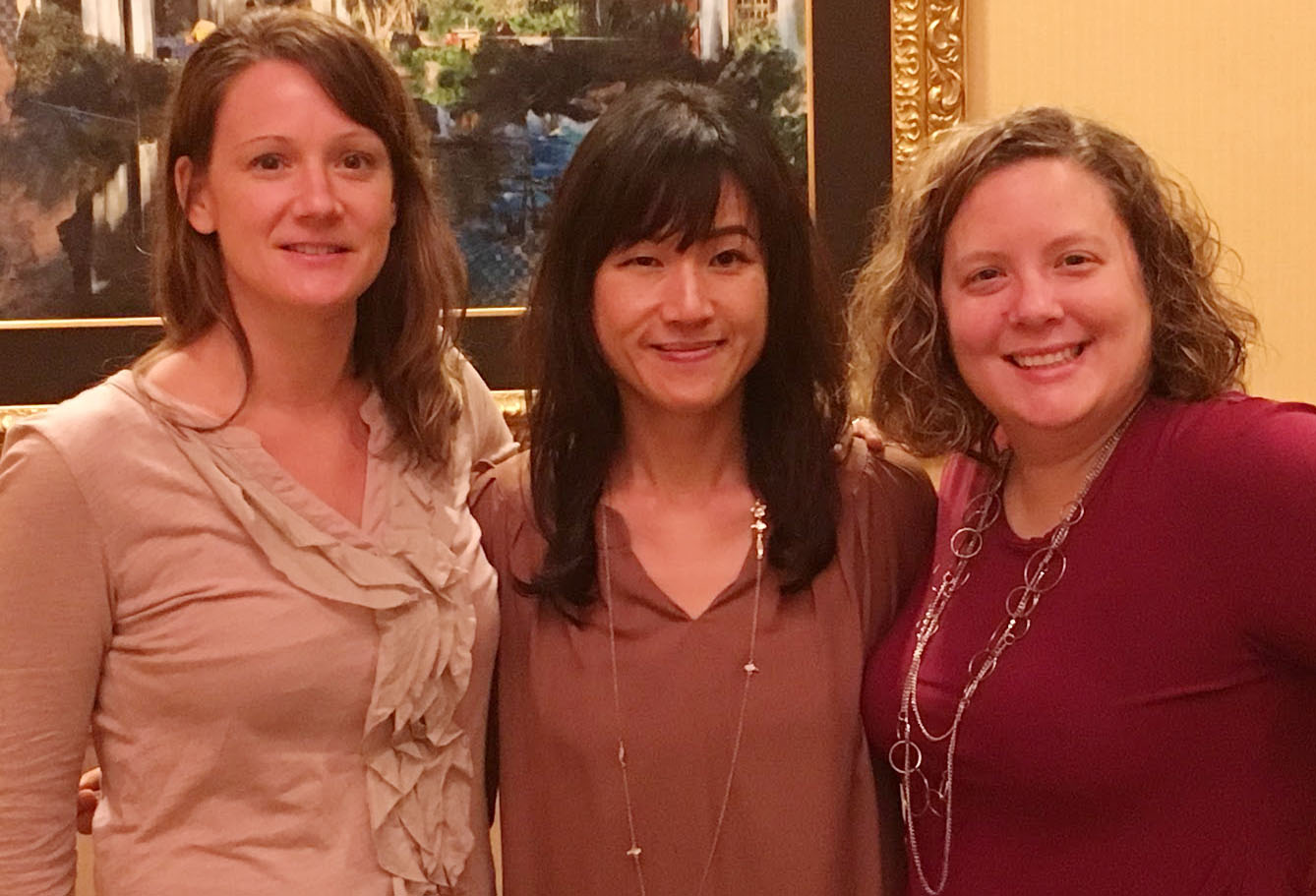2016 UNC CAUSE Conference Recap

From October 5-7, 2016, a number of DELTA staff attended the UNC CAUSE Conference in Winston-Salem, N.C. UNC CAUSE is an organization dedicated to helping information technology professionals in the UNC system collaborate and exchange technology leverage between campuses. Some of the key sessions for DELTA staff were about faculty training, presentation and media design and efficiently solving faculty issues.
LearnTech Help Desk Coordinator Emanuel Brunson took a different approach to note-taking during sessions. He began using Sketchnotes, visual notes that are a mix of writing, sketching, shapes and hand-drawn typography. “Dual coding takes advantage of both what we hear (10% retention alone) and what we see (35% retention alone), for better retention (65% retention combined),” said Brunson.
For Instructional Technologist Suzanne Edmonds, a variety of sessions stood out to her. In the Unconference session, faculty from across the UNC System were able to share their experiences with training for faculty and staff. Topics of discussion included marketing materials for training sessions, campus communication channels and online training.
Many schools are using digital marketing to reach faculty about training opportunities, including tweeting out events, using digital signs for promotion and marketing to everyone — not just those required to use a certain software or service. DELTA staff discussed their efforts in online training that seem to be getting the most attention and enrollments.

i3 @ UNC
Another interesting session for Edmonds was “Preparing Teachers for the Online Classroom (i3 @ UNC).” A program of the UNC system, i3 stands for Instructional Innovation Incubator and aims to help faculty rethink education and their classroom experience. The i3 program is not focused on what the final course looks like but developing the faculty as instructors and changing their mindsets.
Designing a Presentation Your Brain Will Love
Michael Vaughn from Elon University led a session titled “Design a Presentation Your Brain will Love.” According to Vaughn, a good design is cohesive, engaging, interactive and keeps attention. To create this type of presentation, first start with a blank slide so that everything that gets added will have a purpose. Then, think about the purpose of your presentation and why it is important. Vaughn explained the importance of adding content before visuals and telling a story through the presentation.
Vaughn said the brain retains information better when more than one sense is involved. The mind processes visuals faster than text and visual reinforcement makes things actually stay in your mind. Having too much text can overload your audience, so putting one single idea on a slide is one way to keep simplicity in presentations. Vaughn said to help the audience manage the information, stick to giving three pieces of information at a time so the audience can form something cohesive in their brain. Vaughn mentioned two resources for faculty on presentation design — Non-Designer’s Design Book and Presentation Zen.
Blackboard and Alphanumeric
Technology Support Technician Jacob Prichard attended vendor sessions from Blackboard and Alphanumeric and sessions about WordPress. During the Blackboard session, DELTA staff learned about a new student mobile app. The app is not yet enabled at NC State, but it will be the place for all things related to Blackboard, including Collaborate.
In the Alphanumeric vendor session led by Steve Chase titled “Driving Quality in your Service Management Process,” Chase highlights how other organizations are using innovative concepts to improve quality and efficiency. A few of the key points include having help desk tier 2 staff immediately solve complex problems instead of having tier 1 attempt first — saving time for all involved.
Chase also spoke about creating a self-service portal for faculty to solve simple issues. The portal may include a knowledge base and even short screencasts; however, it is important to promote these resources to faculty because they might not be aware of them. By doing preparation work and helping faculty solve simple issues, the staff will save time and therefore save money.

Media-tastic
James Lewis from the University of North Carolina at Pembroke presented “Learn to be Media-tastic” — a session about creating visually stunning media without going over the budget by using tools you already have. For the iPad, having good cases, lenses and mics can improve the quality of the video produced.
Lewis covered apps to enhance video production as well. Explain Everything is an interactive whiteboard app, Filmic Pro allows for advanced camera settings on an iPad or Android, Switcher Pro syncs iPads over WiFi to switch between live video feeds from each device and Nearpod is a synchronous presentation/assessment tool.
DELTA ISS Presenters

A number of the DELTA Instructional Support Services team also presented at the conference. Edmonds along with Lead Instructional Technologist Yiling Chappelow and Program Coordinator/Trainer Allie Giro presented a session titled “Plan. Teach. Assess. Repeat.” aimed to revamp workshop teaching.
Senior Coordinator for Learning Management Systems Martin Dulberg presented “Learning Technology Governance: Creating Transparency and Buy-in.” The session included resources for ideas about learning technology governance.
Associate Director of Instructional Technology Support Scott Watkins presented on the importance of including the support perspective when planning and designing LMS tools. The presentation was titled “Feeling Their Pain: Improving LMS Usability with Help Desk Data.”
Technology Support Technician Marc Gracieux led a session titled “Show. Don’t Just Tell. Improving the End User’s Experience.” Gracieux’s goal for the presentation was to create ways to communicate visually with faculty and staff through screencasts.
Other DELTA presenters included Mike Cuales, Cathi Dunnagan and Bethanne Winzeler.
Related Links:


